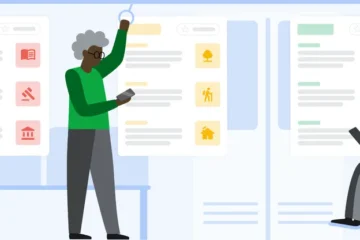Within hours of their performance at a Donald Trump rally in Pensacola, Fla., last January, the U.S.A. Freedom Kids were a sensation.
You remember the video: Three preteen girls in star-spangled outfits crisply working through simple choreography as they lip-synced an upbeat update to “Over There.”
That infectious performance kicked off a flurry of media appearances. The Freedom Kids told “Inside Edition” that Trump told them that he planned tolisten to their CD all night. The group, which had been around for about 2½ years by that point, was a viral sensation largely inextricable from Trump himself.
Now, though, the relationship is different. Jeff Popick, father of the smallest Freedom Kid and author of “Freedom’s Call” (the song performed at the Trump rally), told The Washington Post by phone on Monday that he planned to file a lawsuit against the campaign for violating its agreement with the group.
“This is not a billion-dollar lawsuit,” Popick said. “I’m doing this because I think they have to do the right thing. And if this means having to go through the court system to enforce them doing the right thing, then that’s what I have to do. I’m not looking to do battle with the Trump campaign, but I have to show my girls that this is the right thing.”
Popick is quick to explain that the agreement was not written down, but, instead, involves promises from various agents of the Trump campaign which he says were then broken.
It started in Pensacola. When Popick first reached out to the Trump campaign about performing, he spoke with various people including former campaign manager Corey Lewandowski. His understanding from the campaign was that the Kids would make two appearances in Florida, where Popick lives. The first event didn’t come to fruition, and Popick says he asked for $2,500 in payment for the second performance, in Pensacola. The campaign made a counter-offer: How about a table where the group could presell albums? Popick took the deal.
When they arrived at the venue, though, there was no table, Popick says. The result was “complete chaos,” he said. “They clearly had made no provisions for that.”
Popick, believing that he was owed some alternate compensation, tried to contact the campaign afterward, without luck. In addition to costs spent on promotional materials for the nonexistent table, Popick says, he also lost several promotional opportunities due to confusion over his relationship with the campaign.
When Trump made the sudden decision to skip the January Fox News debate and instead hold an event for veterans, a representative of the campaign called Popick to see if the Freedom Kids might perform. The call came the day before the event, Popick says, which was being held in Des Moines at 6:30 p.m. With the promise that the exposure from the event would be “huge,” Popick readily agreed, and the kids and their parents packed up for a direct flight to Chicago and a long drive to Iowa.
It wasn’t to be. When the plane landed, Popick had a message from the campaign staffer indicating that there was a change of plan. The campaign invited the performers to attend the rally, which they did, in their outfits. The campaign asked Popick not to talk to the media, he says, but then gave them seats within arm’s length of the press. “They just were constantly coming over, wanting pictures,” Popick said of the news media. “They wanted to take pictures, they wanted to ask questions — and I had to be a real jerk.” The cost of the flights, rental car and hotel were all absorbed by Popick.
After that, he kept reaching out “again and again and again and again,” without luck. He was passed around between staffers; calls went unreturned even after calls were promised. Emails Popick sent to the campaign (which he shared with The Post) detail the interaction between himself and the campaign and his ultimate request. “We are now asking and DEMANDING for what has been promised to us and is now long-overdue (and has been rightly earned by us); that is, a performance at the convention,” an email dated July 9 reads. “Or, be made whole.”
An email to the campaign requesting their understanding of the agreement was not returned by our deadline.
“These are guys that insist they’re straight shooters,” Popick said, “‘You may not like what we’re going to say, but we mean what we say and we say what we mean’ — and they just would not say anything of any substance!”
“I’ve invested a lot of time, effort, money,” he continued, “and it’s just been complete silence.”
It’s worth noting that Popick’s story mirrors analysis of Trump’s record in working with small business owners, some of whom allege that the Republican nominee failed to live up to financial and other commitments he’d made to them.
Popick has consulted with an attorney who thinks he has a case. “We are owed compensation or, as the agreement is, a performance. That’s what the agreement was,” he said. “In lieu of compensation, in lieu of monetary compensation, that we would have this performance. It was largely a verbal contract, but a contract nonetheless and on two different occasions.” He expects to file the lawsuit within a few weeks.
Popick came into the relationship as a Trump fan. “I grew up in New York, where he was sort of a celebrity before he was a celebrity,” Popick said. “I admired what he was able to accomplish. I read all of his books at this point back probably decades. … I was a fan before he was a candidate.”
He’s not certain, though, if he’s still a fan.
“At this point, my position is that I have no position, really,” Popick said. “What he’s done to my group or what he’s not done for my group doesn’t necessarily make him the best candidate, it doesn’t make him the worst candidate. I still have to mull that over. He might still be the best candidate as president of the United States — or not.”
“What I think I’ve learned,” Popick added, “is that I’m not qualified to be a political commentator.”
If you’re curious, the album will be out in early September. “Freedom’s Call,” which included the line “President Donald Trump knows how to make America great,” will not be on it.


